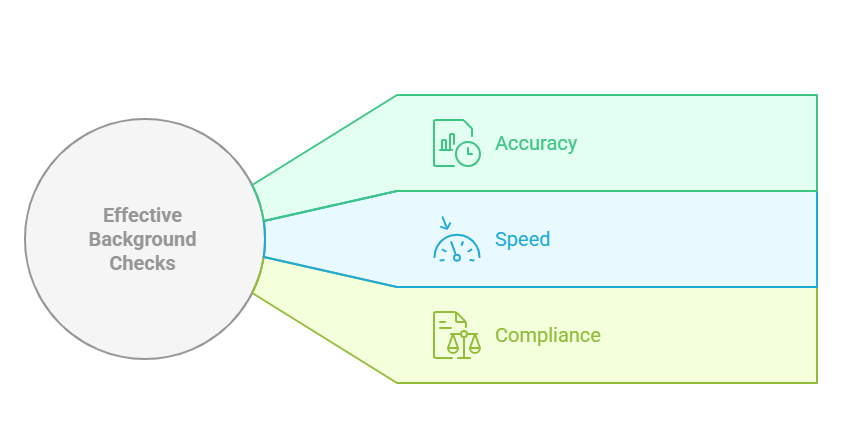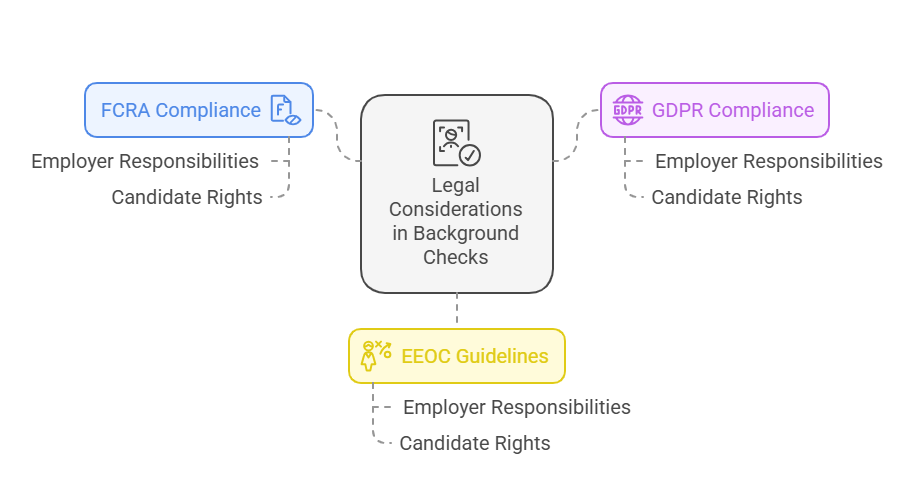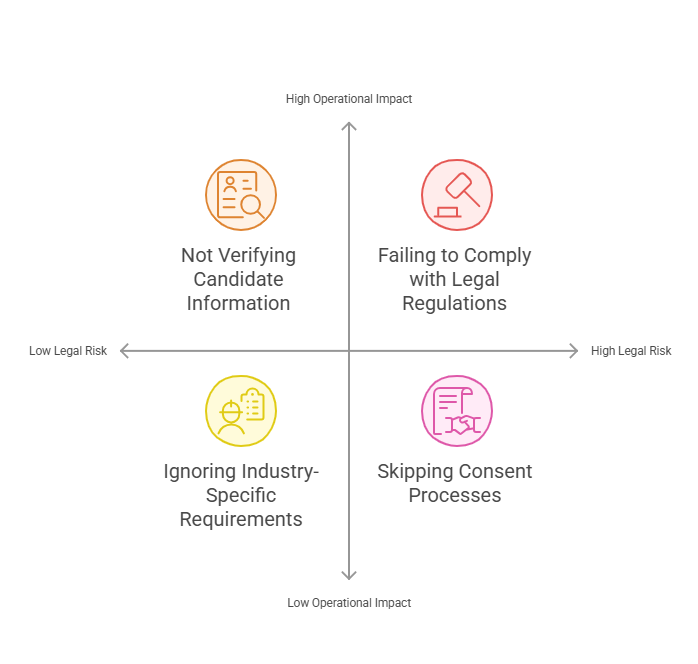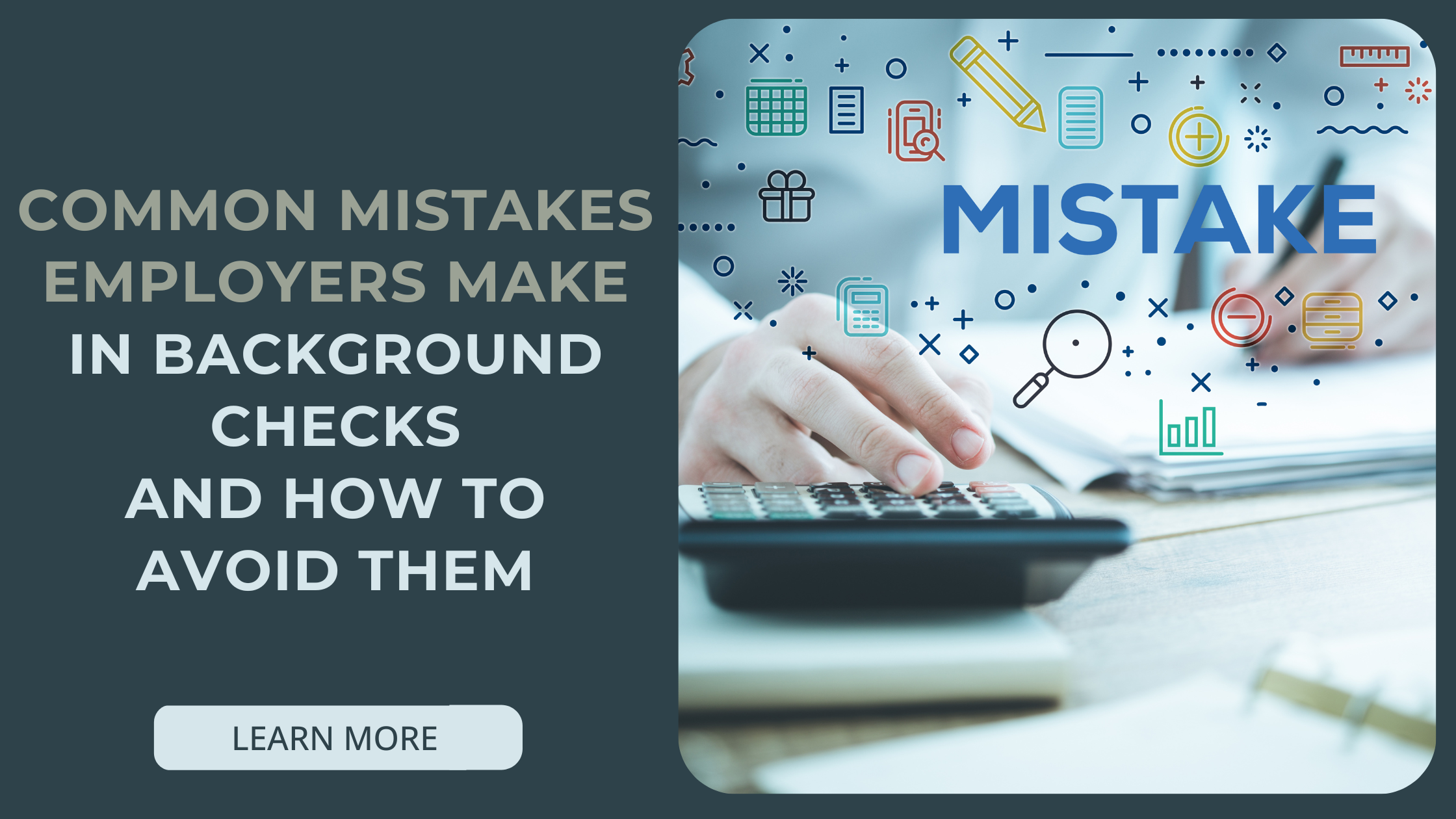Choosing the Right Background Check Provider: RapidHireSolutions vs. Competitors
When it comes to conducting background checks, the choice of provider can significantly impact the quality, speed, and legal compliance of the hiring process. Employers need a reliable partner to help them navigate the complexities of background screening, ensuring that they can make informed, safe, and compliant hiring decisions. In this section, we will explore the benefits of choosing a trusted provider like RapidHireSolutions and compare it with other background check services available in the market.
Why Accuracy, Speed, and Compliance Matter

In the fast-paced hiring environment, employers need a background check provider that can deliver accurate results quickly while ensuring compliance with the necessary regulations. Accuracy ensures that the information employers rely on is reliable and up-to-date, while speed is critical in today’s competitive job market, where delays can lead to losing top candidates. Legal compliance, particularly with regulations such as the Fair Credit Reporting Act (FCRA) and GDPR, is non-negotiable, as failure to comply can result in costly legal consequences.
RapidHireSolutions stands out as a top-tier provider in these areas. With a commitment to data accuracy, fast processing times, and adherence to legal requirements, they offer employers a comprehensive and hassle-free background check experience.
Comparison Table: RapidHireSolutions vs. Competitors
| Feature |
RapidHireSolutions |
Competitor A |
Competitor B |
| Processing Time |
✅ 24 hours |
❌ 15-20 days |
❌ 10-14 days |
| Data Accuracy |
✅ High |
❌ Moderate |
❌ Low |
| Compliance with Laws (FCRA, GDPR) |
✅ Full compliance |
❌ Partial compliance |
❌ Limited compliance |
| Customer Support & Customization |
✅ 24/7 support, tailored plans |
❌ Limited support |
❌ Basic support |
| Pricing Transparency |
✅ Clear and upfront |
❌ Hidden fees |
❌ Lack of transparency |
Pros & Cons: RapidHireSolutions vs. Competitors
To help employers make an informed decision, here is a breakdown of the pros and cons of choosing RapidHireSolutions compared to its competitors:
Pros of RapidHireSolutions:
- Fast Processing: Background checks are completed in as little as 24 hours, reducing the time-to-hire.
- Accurate Data: Utilizes up-to-date databases, ensuring the information is accurate and reliable.
- Full Legal Compliance: Fully compliant with legal standards such as the FCRA, GDPR, and EEOC guidelines.
- Exceptional Customer Support: 24/7 customer service and tailored background check solutions for businesses of all sizes.
- Transparent Pricing: No hidden fees, and all costs are upfront, making it easier to budget for background checks.
Cons of Competitors:
- Slow Processing Times: Many competitors take 10-20 days to process background checks, causing delays in the hiring process.
- Inconsistent Data Accuracy: Some providers may use outdated or incomplete databases, leading to missed red flags.
- Limited Legal Compliance: Some competitors do not fully comply with industry regulations, putting employers at risk of non-compliance.
- Poor Customer Support: Many competitors offer limited support, which can lead to delays in resolving issues.
- Hidden Fees: Some providers have unclear pricing structures, which can surprise employers with additional costs.
Data Table: Detailed Service Breakdown
| Service Category |
RapidHireSolutions |
Competitor A |
Competitor B |
| Criminal Background Checks |
✅ Comprehensive, nationwide |
❌ Limited to state databases |
❌ Incomplete data coverage |
| Employment Verification |
✅ Accurate and verified |
❌ Limited verification scope |
❌ Low accuracy |
| Education Verification |
✅ Verified with institutions |
❌ Inconsistent checks |
❌ Not verified |
| Reference Checks |
✅ Direct reference contact |
❌ Automated checks only |
❌ Basic reference checks |
| Customizable Solutions |
✅ Tailored for your needs |
❌ Generic services |
❌ Basic offerings |
RapidHireSolutions stands out in various service categories, offering more comprehensive and accurate background checks, faster turnaround times, and better customer support. This makes it an ideal choice for businesses looking to streamline their hiring process while ensuring compliance and data reliability.
Closing Statement
Selecting the right background check provider is critical for ensuring a smooth, compliant, and efficient hiring process. By choosing a provider like RapidHireSolutions, employers can avoid the common pitfalls associated with background checks, ensuring they make well-informed and legally sound hiring decisions. As we move forward, let’s explore the legal considerations surrounding background checks and how employers can navigate these requirements effectively.
Legal Considerations in Background Checks
When conducting background checks, employers must be aware of various legal regulations to ensure that their hiring practices remain compliant. Failing to follow these guidelines can lead to serious legal repercussions, including lawsuits, fines, and loss of reputation. Understanding the rights of candidates and the responsibilities of employers is essential for creating a fair, transparent, and legally sound background check process.

FCRA (Fair Credit Reporting Act) Compliance
The Fair Credit Reporting Act (FCRA) is a U.S. federal law that regulates how background checks should be conducted. It establishes specific guidelines to protect the privacy of individuals and to ensure that employers use background information responsibly.
- Employer Responsibilities: Employers must obtain written consent from candidates before running a background check. Additionally, if an adverse action (such as not hiring a candidate) is taken based on the results, the employer must notify the candidate and provide them with a copy of the report.
- Candidate Rights: Candidates have the right to dispute inaccurate information on their background report and can request a free copy of the report from the background check provider.
GDPR (General Data Protection Regulation)
For employers operating in the European Union (EU) or dealing with EU-based candidates, compliance with the General Data Protection Regulation (GDPR) is essential. GDPR ensures that personal data is handled securely and with the consent of the individual.
- Employer Responsibilities: Employers must obtain explicit consent from candidates before collecting or processing personal data. They are also required to keep the data secure and to inform candidates of their data rights, including the right to access and delete their information.
- Candidate Rights: Under GDPR, candidates have the right to request information about how their data is being used, as well as the right to have their data deleted in certain circumstances.
EEOC (Equal Employment Opportunity Commission) Guidelines
The EEOC provides guidance on how employers should use background check information to avoid discrimination. Employers must ensure that background checks are applied uniformly to all candidates and do not disproportionately affect certain protected groups.
- Employer Responsibilities: Employers must avoid using criminal background checks in a way that disproportionately excludes candidates based on race, national origin, or other protected characteristics, unless there is a legitimate business reason for doing so.
- Candidate Rights: Candidates should not be unfairly excluded from employment opportunities based on background information unless it is directly related to the job they are applying for.
Key Legal Aspects to Consider
- Written Consent: Always obtain written consent from candidates before performing background checks.
- Adverse Action: If a background check results in an adverse hiring decision, the employer must provide the candidate with the right to review the report before making a final decision.
- State-Specific Laws: Some states have additional regulations that go beyond federal laws, such as restricting the use of criminal history in hiring decisions. Employers must be aware of these local laws to ensure compliance.
- Data Security: Employers must safeguard candidates’ personal information throughout the process, especially when using third-party providers.
FAQs (5 Questions & Answers)
Failing to conduct a background check correctly can result in legal consequences, including violations of the FCRA, discrimination lawsuits, or penalties for mishandling candidate data. Non-compliance with state or federal regulations could also lead to fines.
RapidHireSolutions processes background checks in as little as 24 hours, providing employers with fast, reliable results without unnecessary delays.
Yes, employers can check a candidate’s credit score, but only for certain positions that require financial responsibility, such as roles in banking or accounting. Employers must obtain written consent before performing this check.
If false information is found, candidates have the right to dispute the report. Employers must notify the candidate of any adverse actions taken based on incorrect information and give them an opportunity to correct it.
Employers should choose a reputable background check provider that uses updated, reliable data sources and offers comprehensive checks. It's also essential to verify information with multiple sources and ensure compliance with legal standards.
Conclusion
Conducting background checks is an essential part of the hiring process, but it comes with significant legal responsibilities. Employers must navigate complex regulations, such as the FCRA, GDPR, and EEOC guidelines, to avoid legal risks and ensure fair treatment of candidates. Choosing the right background check provider, like RapidHireSolutions, can help mitigate these risks by ensuring compliance, accuracy, and efficiency. By following these best practices, employers can create a smoother, legally compliant hiring process that protects both their organization and candidates.




